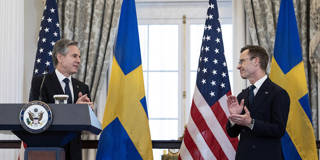After more than 200 years of neutrality with respect to regional and global great-power conflicts, Sweden has now chosen a side with its formal accession to NATO. With major strategic assets to offer the alliance, Sweden's membership represents a fundamental shift in the regional balance of power.
TORONTO – On March 7, Sweden officially joined the North Atlantic Treaty Organization, ending its 200-year-old policy of neutrality. The decision was largely influenced by the changing security environment following Russia’s 2022 invasion of Ukraine, and geographic considerations.
Sweden embraced neutrality as a result of repeated conflicts with Russia – particularly the early nineteenth-century Finnish War, when it lost Finland to Russia. Now, Russian aggression has forced it into a dramatic reversal that will have major implications for the regional balance of power.
Following the Great Northern War (1700-1721), and the loss of Finland to Russia in the early nineteenth century, Sweden gradually concluded that neutrality would best serve its sovereignty and national security. It avoided armed conflict, abstained from involvement in great-power spheres of influence, eschewed military alliances, and focused on international peacekeeping and humanitarian initiatives. During the Cold War, its official policy was characterized as “alliansfrihet i fred, syftande till neutralitet i krig” (“non-alignment in peace, so as to maintain neutrality in war”), despite being economically, culturally, and militarily aligned with the United States.

TORONTO – On March 7, Sweden officially joined the North Atlantic Treaty Organization, ending its 200-year-old policy of neutrality. The decision was largely influenced by the changing security environment following Russia’s 2022 invasion of Ukraine, and geographic considerations.
Sweden embraced neutrality as a result of repeated conflicts with Russia – particularly the early nineteenth-century Finnish War, when it lost Finland to Russia. Now, Russian aggression has forced it into a dramatic reversal that will have major implications for the regional balance of power.
Following the Great Northern War (1700-1721), and the loss of Finland to Russia in the early nineteenth century, Sweden gradually concluded that neutrality would best serve its sovereignty and national security. It avoided armed conflict, abstained from involvement in great-power spheres of influence, eschewed military alliances, and focused on international peacekeeping and humanitarian initiatives. During the Cold War, its official policy was characterized as “alliansfrihet i fred, syftande till neutralitet i krig” (“non-alignment in peace, so as to maintain neutrality in war”), despite being economically, culturally, and militarily aligned with the United States.